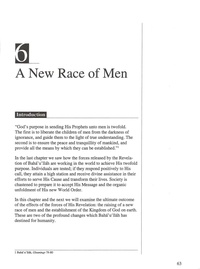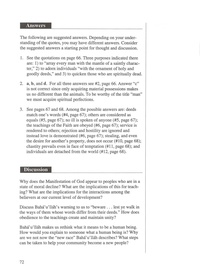The Significance of Bahá’u’lláh’s Revelation/A New Race of Men
A New Race of Men[edit]
Introduction[edit]
"God's purpose in sending His Prophets unto men is twofold. The first is to liberate the children of men from the darkness of ignorance, and guide them to the light of true understanding. The second is to ensure the peace and tranquillity of mankind, and provide all the means by which they can be established."
In the last chapter we saw how the forces released by the Revelation of Bahá’u’lláh are working in the world to achieve His twofold purpose. Individuals are tested; if they respond positively to His call, they attain a high station and receive divine assistance in their efforts to serve His Cause and transform their lives. Society is chastened to prepare it to accept His Message and the organic unfoldment of His new World Order.
In this chapter and the next we will examine the ultimate outcome of the effects of the forces of His Revelation: the raising of a new race of men and the establishment of the Kingdom of God on earth. These are two of the profound changes which Bahá’u’lláh has destined for humanity.
1 Bahá’u’lláh, Gleanings 79-80
[Page 64]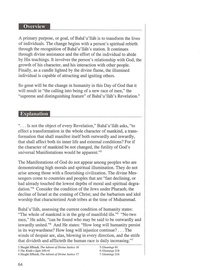
Overview[edit]
A primary purpose, or goal, of Bahá’u’lláh is to transform the lives of individuals. The change begins with a person's spiritual rebirth through the recognition of Bahá’u’lláh’s station. It continues through divine assistance and the effort of the individual to abide by His teachings. It involves the person's relationship with God, the growth of his character, and his interaction with other people. Finally, as a candle lighted by the divine flame, the illumined individual is capable of attracting and igniting others.
So great will be the change in humanity in this Day of God that it will result in "the calling into being of a new race of men," the "supreme and distinguishing feature" of Bahá’u’lláh’s Revelation.²
Explanation[edit]
"... Is not the object of every Revelation," Bahá’u’lláh asks, "to effect a transformation in the whole character of mankind, a transformation that shall manifest itself both outwardly and inwardly, that shall affect both its inner life and external conditions? For if the character of mankind be not changed, the futility of God's universal Manifestations would be apparent."³
The Manifestations of God do not appear among peoples who are demonstrating high morals and spiritual illumination. They do not arise among those with a flourishing civilization. The divine Messengers come to countries and peoples that are "fast declining, or had already touched the lowest depths of moral and spiritual degradation." Consider the condition of the Jews under Pharaoh; the decline of Israel at the coming of Christ; and the barbarism and idol worship that characterized Arab tribes at the time of Muḥammad.
Bahá’u’lláh, assessing the current condition of humanity states: "The whole of mankind is in the grip of manifold ills." "No two men," He adds, "can be found who may be said to be outwardly and inwardly united." And He states: "How long will humanity persist in its waywardness? How long will injustice continue?... The winds of despair are, alas, blowing in every direction, and the strife that divideth and afflicteth the human race is daily increasing."
2 Shoghi Effendi, The Advent of Divine Justice 16
3 The Kitáb-i-Íqán 240-41
4 Shoghi Effendi, The Advent of Divine Justice 17
5 Gleanings 81
6 Gleanings 218
7 Gleanings 216
[Page 65]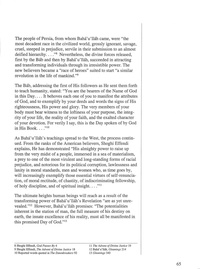 The people of Persia, from whom Bahá’u’lláh came, were "the most decadent race in the civilized world, grossly ignorant, savage, cruel, steeped in prejudice, servile in their submission to an almost deified hierarchy...."8 Nevertheless, the divine forces released, first by the Báb and then by Bahá’u’lláh, succeeded in attracting and transforming individuals through its irresistible power. The new believers became a "race of heroes" suited to start "a similar revolution in the life of mankind."
The people of Persia, from whom Bahá’u’lláh came, were "the most decadent race in the civilized world, grossly ignorant, savage, cruel, steeped in prejudice, servile in their submission to an almost deified hierarchy...."8 Nevertheless, the divine forces released, first by the Báb and then by Bahá’u’lláh, succeeded in attracting and transforming individuals through its irresistible power. The new believers became a "race of heroes" suited to start "a similar revolution in the life of mankind."
The Báb, addressing the first of His followers as He sent them forth to teach humanity, stated: "You are the bearers of the Name of God in this Day.... It behoves each one of you to manifest the attributes of God, and to exemplify by your deeds and words the signs of His righteousness, His power and glory. The very members of your body must bear witness to the loftiness of your purpose, the integrity of your life, the reality of your faith, and the exalted character of your devotion. For verily I say, this is the Day spoken of by God in His Book..."10
As Bahá’u’lláh’s teachings spread to the West, the process continued. From the ranks of the American believers, Shoghi Effendi explains, He has demonstrated "His almighty power to raise up from the very midst of a people, immersed in a sea of materialism, a prey to one of the most virulent and long-standing forms of racial prejudice, and notorious for its political corruption, lawlessness and laxity in moral standards, men and women who, as time goes by, will increasingly exemplify those essential virtues of self-renunciation, of moral rectitude, of chastity, of indiscriminating fellowship, of holy discipline, and of spiritual insight. . . ."11
The ultimate heights human beings will reach as a result of the transforming power of Bahá’u’lláh’s Revelation "are as yet unrevealed."12 However, Bahá’u’lláh promises: "The potentialities inherent in the station of man, the full measure of his destiny on earth, the innate excellence of his reality, must all be manifested in this promised Day of God."13
8 Shoghi Effendi, God Passes By 4
9 Shoghi Effendi, The Advent of Divine Justice 18
10 Reported words quoted in The Dawnbreakers 92
11 The Advent of Divine Justice 19
12 Bahá’u’lláh, Gleanings 214
13 Gleanings 340
[Page 66]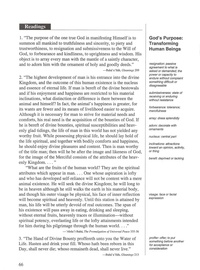
Readings[edit]
1. "The purpose of the one true God in manifesting Himself is to summon all mankind to truthfulness and sincerity, to piety and trustworthiness, to resignation and submissiveness to the Will of God, to forbearance and kindliness, to uprightness and wisdom. His object is to array every man with the mantle of a saintly character, and to adorn him with the ornament of holy and goodly deeds." -Bahá’u’lláh, Gleanings 299
2. "The highest development of man is his entrance into the divine Kingdom, and the outcome of this human existence is the nucleus and essence of eternal life. If man is bereft of the divine bestowals and if his enjoyment and happiness are restricted to his material inclinations, what distinction or difference is there between the animal and himself? In fact, the animal's happiness is greater, for its wants are fewer and its means of livelihood easier to acquire. Although it is necessary for man to strive for material needs and comforts, his real need is the acquisition of the bounties of God. If he is bereft of divine bounties, spiritual susceptibilities and heavenly glad tidings, the life of man in this world has not yielded any worthy fruit. While possessing physical life, he should lay hold of the life spiritual, and together with bodily comforts and happiness, he should enjoy divine pleasures and content. Then is man worthy of the title man; then will he be after the image and likeness of God, for the image of the Merciful consists of the attributes of the heavenly Kingdom...."
"What are the fruits of the human world? They are the spiritual attributes which appear in man. . . . One whose aspiration is lofty and who has developed self-reliance will not be content with a mere animal existence. He will seek the divine Kingdom; he will long to be in heaven although he still walks the earth in his material body, and though his outer visage be physical, his face of inner reflection will become spiritual and heavenly. Until this station is attained by man, his life will be utterly devoid of real outcomes. The span of his existence will pass away in eating, drinking and sleeping, without eternal fruits, heavenly traces or illumination—without spiritual potency, everlasting life or the lofty attainments intended for him during his pilgrimage through the human world...." -‘Abdu’l-Bahá, The Promulgation of Universal Peace 335-36
3. "The Hand of Divine Bounty proffereth unto you the Water of Life. Hasten and drink your fill. Whoso hath been reborn in this Day, shall never die; whoso remaineth dead, shall never live." -Bahá’u’lláh, Gleanings 213
God's Purpose: Transforming Human Beings[edit]
resignation: passive agreement to what is asked or demanded; the power or capacity to endure without complaint something difficult or disagreeable
submissiveness: state of receiving or enduring without resistance
forbearance: tolerance; mercifulness
array: dress splendidly
adorn: decorate with ornaments
nucleus: central part
inclinations: attractions toward an opinion, activity, or thing
bereft: deprived or lacking
visage: face or facial expression
proffer: offer; to put something before another for acceptance or consideration
[Page 67]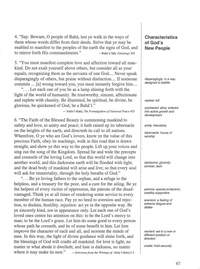
Characteristics of God's New People[edit]
4. "Say: Beware, O people of Bahá, lest ye walk in the ways of them whose words differ from their deeds. Strive that ye may be enabled to manifest to the peoples of the earth the signs of God, and to mirror forth His commandments." -Bahá’u’lláh, Gleanings 305
5. "You must manifest complete love and affection toward all mankind. Do not exalt yourself above others, but consider all as your equals, recognizing them as the servants of one God..... Never speak disparagingly of others, but praise without distinction.... If someone commits... [a] wrong toward you, you must instantly forgive him....
"... Let each one of you be as a lamp shining forth with the light of the world of humanity. Be trustworthy, sincere, affectionate and replete with chastity. Be illumined, be spiritual, be divine, be glorious, be quickened of God, be a Bahá’í." -‘Abdu’l-Bahá, The Promulgation of Universal Peace 453
6. "The Faith of the Blessed Beauty is summoning mankind to safety and love, to amity and peace; it hath raised up its tabernacle on the heights of the earth, and directeth its call to all nations. Wherefore, O ye who are God's lovers, know ye the value of this precious Faith, obey its teachings, walk in this road that is drawn straight, and show ye this way to the people. Lift up your voices and sing out the song of the Kingdom. Spread far and wide the precepts and counsels of the loving Lord, so that this world will change into another world, and this darksome earth will be flooded with light, and the dead body of mankind will arise and live; so that every soul will ask for immortality, through the holy breaths of God."
"... Be ye loving fathers to the orphan, and a refuge to the helpless, and a treasury for the poor, and a cure for the ailing. Be ye the helpers of every victim of oppression, the patrons of the disadvantaged. Think ye at all times of rendering some service to every member of the human race. Pay ye no heed to aversion and rejection, to disdain, hostility, injustice: act ye in the opposite way. Be ye sincerely kind, not in appearance only. Let each one of God's loved ones centre his attention on this: to be the Lord's mercy to man; to be the Lord's grace. Let him do some good to every person whose path he crosseth, and be of some benefit to him. Let him improve the character of each and all, and reorient the minds of men. In this way, the light of divine guidance will shine forth, and the blessings of God will cradle all mankind: for love is light, no matter in what abode it dwelleth; and hate is darkness, no matter where it may make its nest." --Selections from the Writings of ‘Abdu’l-Bahá 2-3
disparagingly: in a way designed to belittle
replete: full
quickened: alive; entered into active growth and development
amity: friendship
tabernacle: house of worship
darksome: gloomily somber; dark
patrons: special protectors; wealthy supporters
aversion: a feeling of extreme disgust and dislike
reorient: set in a new or different position or direction
cradle: hold securely
[Page 68]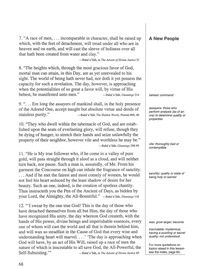
A New People[edit]
7. "A race of men, . . . incomparable in character, shall be raised up which, with the feet of detachment, will tread under all who are in heaven and on earth, and will cast the sleeve of holiness over all that hath been created from water and clay." --Bahá’u’lláh, in The Advent of Divine Justice 31
8. "The heights which, through the most gracious favor of God, mortal man can attain, in this Day, are as yet unrevealed to his sight. The world of being hath never had, nor doth it yet possess the capacity for such a revelation. The day, however, is approaching when the potentialities of so great a favor will, by virtue of His behest, be manifested unto men." -Bahá’u’lláh, Gleanings 214
9. "... Ere long the assayers of mankind shall, in the holy presence of the Adored One, accept naught but absolute virtue and deeds of stainless purity." -Bahá’u’lláh, The Hidden Words, Persian #69, 46
10. "They who dwell within the tabernacle of God, and are established upon the seats of everlasting glory, will refuse, though they be dying of hunger, to stretch their hands and seize unlawfully the property of their neighbor, however vile and worthless he may be." -Bahá’u’lláh, Gleanings 298-99
11. "He is My true follower who, if he come to a valley of pure gold, will pass straight through it aloof as a cloud, and will neither turn back, nor pause. Such a man is, assuredly, of Me. From his garment the Concourse on high can inhale the fragrance of sanctity. And if he met the fairest and most comely of women, he would not feel his heart seduced by the least shadow of desire for her beauty. Such an one, indeed, is the creation of spotless chastity. Thus instructeth you the Pen of the Ancient of Days, as bidden by your Lord, the Almighty, the All-Bountiful.” --Bahá’u’lláh, Gleanings 118
12. "I swear by the one true God! This is the day of those who have detached themselves from all but Him, the day of those who have recognized His unity, the day whereon God createth, with the hands of His power, divine beings and imperishable essences, every one of whom will cast the world and all that is therein behind him, and will wax so steadfast in the Cause of God that every wise and understanding heart will marvel....' 'The day is approaching when God will have, by an act of His Will, raised up a race of men the nature of which is inscrutable to all save God, the All-Powerful, the Self-Subsisting."" -Bahá’u’lláh, in The Advent of Divine Justice 85
behest: command
assayers: those who perform analysis (as of an ore) to determine quality or properties
vile: thoroughly bad or contemptible
sanctity: quality or state of being holy or sacred
wax: grow larger; become
inscrutable: mysterious; having a puzzling or secret quality; not understood
For more quotations on topics raised in this lesson see the index, page 83.
[Page 69]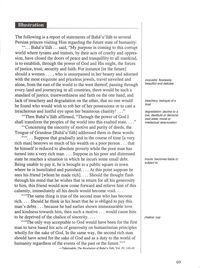
Illustration[edit]
The following is a report of statements of Bahá’u’lláh to several Persian princes visiting Him regarding the future state of humanity:
"... Bahá’u’lláh... said, "My purpose in coming to this corrupt world where tyrants and traitors, by their acts of cruelty and oppression, have closed the doors of peace and tranquillity to all mankind, is to establish, through the power of God and His might, the forces of justice, trust, security and faith. For instance [in the future] should a women..., who is unsurpassed in her beauty and adorned with the most exquisite and priceless jewels, travel unveiled and alone, from the east of the world to the west thereof, passing through every land and journeying in all countries, there would be such a standard of justice, trustworthiness and faith on the one hand, and lack of treachery and degradation on the other, that no one would be found who would wish to rob her of her possessions or to cast a treacherous and lustful eye upon her beauteous chastity! ..."
"Then Bahá’u’lláh affirmed, "Through the power of God I shall transform the peoples of the world into this exalted state. . .
"Concerning the sincerity of motive and purity of deeds, the Tongue of Grandeur [Bahá’u’lláh] addressed them in these words: . Suppose that gradually and in the course of time [a very rich man] bestows so much of his wealth on a poor person... that he himself is reduced to absolute poverty while the poor man has turned into a very rich man.... Suppose in his poor and distressed state he reaches a situation in which he incurs some small debt. Being unable to pay it, he is brought to a public square in town where he is humiliated and punished. . . . At this point suppose he sees his friend [whom he made rich]. ... Should the thought flash through his mind that he wishes that in return for all his generosity to him, this friend would now come forward and relieve him of this calamity, immediately all his deeds would become void. . . .
"The same thing is true of the second man who has become rich.... Should he think in his heart that he is obliged to pay this man's debts... because he had earlier shown immeasurable love and kindness towards him, then such a motive. . . would cause him to be deprived of the chalice of sincerity. ...
"The only way acceptable to God would have been for the first man to have based his acts of generosity on humanitarian principles wholly for the sake of God. In the same way, the second rich man should have acted for the sake of God and as a duty to the world of humanity regardless of the events of the past or the future."
Taherzadeh, The Revelation of Bahá’u’lláh, Vol. IV, 142-43
exquisite: flawlessly beautiful and delicate
treachery: betrayal of a trust
degradation: decline to a low, destitute or demoralized state; moral or intellectual deterioration
incurs: becomes liable or subject to
chalice: cup
[Page 70]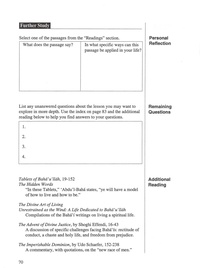
Further Study[edit]
Personal Reflection
Select one of the passages from the “Readings” section.
| What does the passage say? | In what specific ways can this passage be applied in your life? |
|---|---|
Remaining Questions
List any unanswered questions about the lesson you may want to explore in more depth. Use the index on page 83 and the additional reading below to help you find answers to your questions.
|
1.
|
Additional Reading
Tablets of Bahá’u’lláh, 19-152 The Hidden Words “In these Tablets,” ‘Abdu’l-Bahá states, “ye will have a model of how to live and how to be.”
The Divine Art of Living Unrestrained as the Wind: A Life Dedicated to Bahá’u’lláh Compilations of the Bahá’í writings on living a spiritual life.
The Advent of Divine Justice, by Shoghi Effendi, 16-43 A discussion of specific challenges facing Bahá’ís: rectitude of conduct, a chaste and holy life, and freedom from prejudice.
The Imperishable Dominion, by Udo Schaefer, 152-238
A commentary, with quotations, on the “new race of men.”
[Page 71]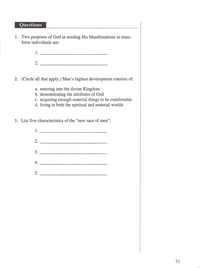
Questions[edit]
1. Two purposes of God in sending His Manifestations to transform individuals are:
- 1. _________________________________________________
- 2. _________________________________________________
2. (Circle all that apply.) Man’s highest development consists of:
- a. entering into the divine Kingdom
- b. demonstrating the attributes of God
- c. acquiring enough material things to be comfortable
- d. living in both the spiritual and material worlds
3. List five characteristics of the “new race of men”:
- 1. _________________________________________________
- 2. _________________________________________________
- 3. _________________________________________________
- 4. _________________________________________________
- 5. _________________________________________________
Answers[edit]
The following are suggested answers. Depending on your understanding of the quotes, you may have different answers. Consider the suggested answers a starting point for thought and discussion.
1. See the quotations on page 66. Three purposes indicated there are: 1) to "array every man with the mantle of a saintly character," 2) to adorn individuals "with the ornament of holy and goodly deeds," and 3) to quicken those who are spiritually dead.
2. a, b, and d. For all three answers see #2, page 66. Answer "c" is not correct since only acquiring material possessions makes us no different than the animals. To be worthy of the title "man" we must acquire spiritual perfections.
3. See pages 67 and 68. Among the possible answers are: deeds match one's words (#4, page 67); others are considered as equals (#5, page 67); no ill is spoken of anyone (#5, page 67); the teachings of the Faith are obeyed (#6, page 67); service is rendered to others; rejection and hostility are ignored and instead love is demonstrated (#6, page 67); stealing, and even the desire for another's property, does not occur (#10, page 68); chastity prevails even in face of temptation (#11, page 68); and individuals are detached from the world (#12, page 68).
Discussion[edit]
Why does the Manifestation of God appear to peoples who are in a state of moral decline? What are the implications of this for teaching? What are the implications for the interactions among the believers at our current level of development?
Discuss Bahá’u’lláh’s warning to us to "beware... lest ye walk in the ways of them whose words differ from their deeds." How does obedience to the teachings create and maintain unity?
Bahá’u’lláh makes us rethink what it means to be a human being. How would you explain to someone what a human being is? Why are we not now the "new race" Bahá’u’lláh describes? What steps can be taken to help your community become a new people?
